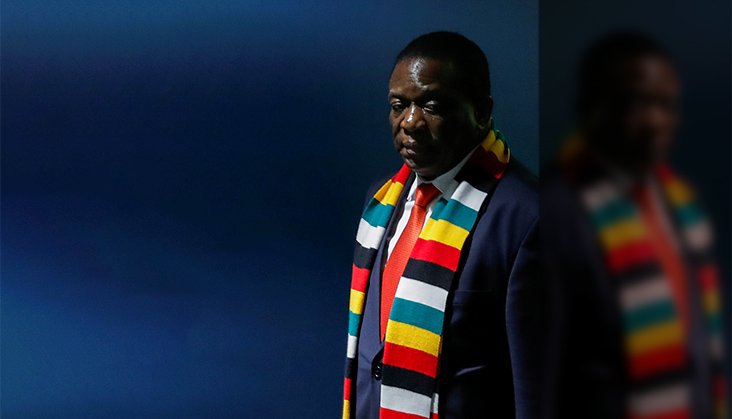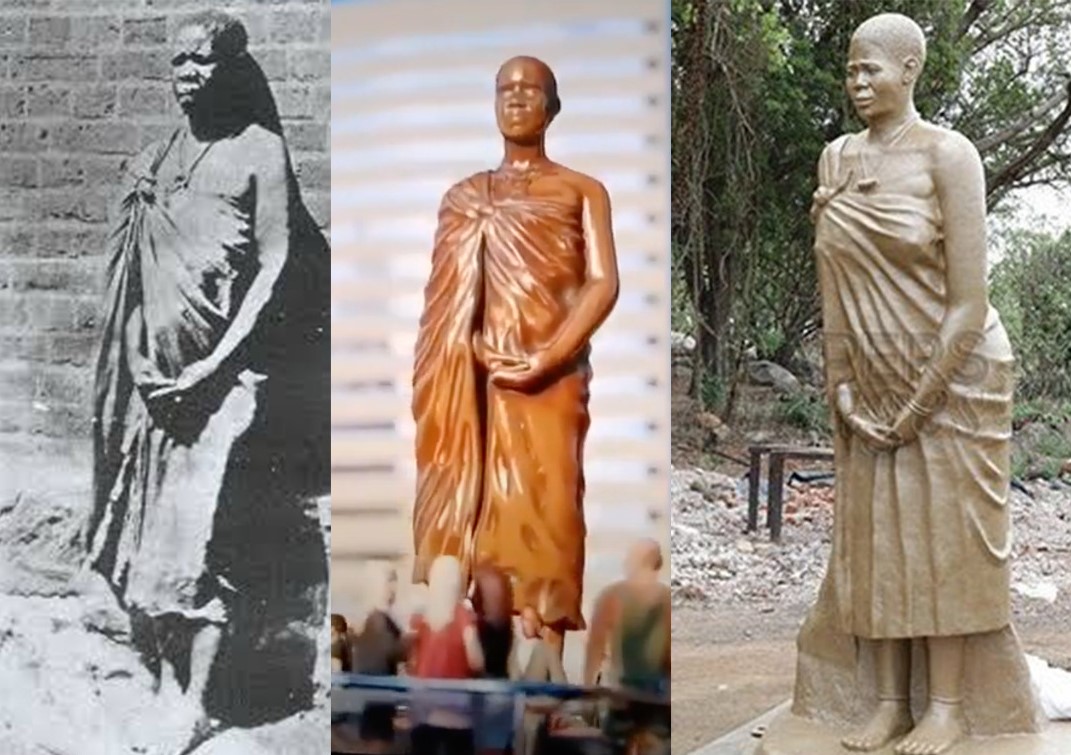
1.12.2020 9:15
Dramatic scenes as Mary Chiwenga, the estranged wife of Vice President Constantino Chiwenga leaves the Harare Magistrates Court on a gurney to awaiting ambulance.
Post published in: Featured
Category Added in a WPeMatico Campaign

1.12.2020 9:15
Dramatic scenes as Mary Chiwenga, the estranged wife of Vice President Constantino Chiwenga leaves the Harare Magistrates Court on a gurney to awaiting ambulance.
Post published in: Featured

1.12.2020
9:15
Dramatic scenes as Mary Chiwenga, the estranged wife of Vice President Constantino Chiwenga arrives at the Harare Magistrates Court in an ambulance.

MUTARE, Zimbabwe—Three years after a military coup that toppled Zimbabwe’s long-time dictator Robert Mugabe, many people in the country have come to a conclusion they can scarcely believe: they regret replacing the old despot.
Though many people in Zimbabwe are glad Mugabe was ousted before he died last year, they have deep regrets about Emmerson Mnangagwa. His ascent to power was greeted in 2017 with jubilant street parties in Harare and promises from the new leader that: “We are witnessing the beginning of a new unfolding democracy.”
As the economy and human rights in the country continue to nosedive, Mnangagwa has proven to be ruthless and corrupt.
“Mnangagwa is worse than Mugabe,” said Lovemore Muradzikwa, a Zimbabwean pro-democracy and human rights activist.
In recent months, scores of people have been arrested, some brutalised or killed as Mnangagwa’s regime mounts an unprecedented clampdown on pro-democracy campaigners, opposition political party members, journalists, and ordinary citizens daring to voice disquiet over rising corruption, the failing economy and a human rights crisis.
In 2018, six people were brutally killed when soldiers opened fire on opposition supporters who were protesting against attempts by the ruling ZANU-PF party to steal a tightly contested general election. And last year, 17 more people were killed when soldiers openly fired shots at citizens protesting over massive fuel price hikes.
Western countries that had warmed to Mnangangwa’s leadership after the November 2017 coup are backing down and expressing frustration over his deteriorating human rights record.
“I can say the only mistake we made was to accept a coup. We never thought Mugabe will be replaced by Mnangagwa,” Muradzikwa told The Daily Beast. “We wanted [the ruling party] ZANU-PF to go as a whole system, not Mugabe alone,”
Muradzikwa said many people in the country thought a transitional arrangement was going to be formed after Mugabe’s unceremonious exit.
“But ZANU-PF and the army disregarded the will of the people. We are in this mess because of the military,” he said.
The removal of Mugabe from power by the army showed how deeply the security forces are embedded in the country’s domestic politics, and the military has only solidified its dominance within the ruling party under Mnangagwa. There are already fears within ZANU-PF that the army could remove Mnangagwa amid reports that the military is no longer satisfied with his performance.
Nicholas Mukundidza, a resident of Mutare district, eastern Zimbabwe, said after more than three decades of Mugabe’s iron fist many people thought the coup was a reprieve from oppression but the new regime has proved to be a nightmare.
“We have thrown ourselves deep into a crisis by supporting a clueless person as an alternative; the country has completely collapsed. The only success [Mnangagwa] has achieved is promoting corruption, increase in human rights violations, massive self and family enrichment which we never experienced under Mugabe,” Mukundidza told The Daily Beast.
Mnangagwa’s administration is struggling under a collapsing economy: national debt is ballooning; the agricultural sector, which was once thriving, is on its knees; teachers, nurses and doctors are constantly on strike over salaries. Corruption is also rampant in all sectors of the economy, particularly gold and diamond mining, the oil industry, and government tenders. The country is reportedly losing billions of dollars a year through the pilfering of gold and diamonds by companies or individuals linked to senior politicians and government officials. At the same time, business people with strong connections to senior politicians and government officials have control of the country’s lucrative oil sector.
Mukundidza said Mugabe got all the blame as the leader of ZANU-PF and head of the government but he was sitting on a destructive system over which he did not have much direct control by the end of his decades in power. Many senior members in his party had become involved in corrupt schemes.
“Out of suffering and desperation for another leader other than Mugabe, we blindly supported his removal. It’s like someone who has been confined to darkness over a long period of time; when you get exposed to a ray of light you celebrate for finally seeing the light, which turns out to be a small light from a melting candle and does not last long before darkness comes back again,” he said.
While Mnangagwa has maintained that he will contest the next presidential election in 2023, some experts believe he might be pushed out of power before then as public resentment continues to grow. There have been reports of plots to remove Mnangagwa through a vote of no confidence within his party or another military assisted intervention.
David Panganai, a spokesman for the MDC Alliance opposition party, told The Daily Beast that Mugabe had not been a better leader, but life under Mnangagwa had become worse.
“Under Mugabe, people were disappeared and tortured; human rights were never respected, and nothing has changed, if anything, it’s worse. The populace is now living in extreme fear from those who are supposed to defend and protect them; the economy has taken a serious knock since the coup,” Panganai said.
He said many Zimbabweans had given Mnangagwa the benefit of doubt when he spoke of his intention to fight corruption, which has been one of the major sources of the country’s economic decay, but instead corruption is getting worse.
The leader of the MDC Alliance has vowed to block the 2023 general elections if Mnangagwa has not implemented necessary political and electoral reforms for a free and fair election. At the same time, Mnangagwa is reportedly courting minor political parties to try to form a coalition government and forego the 2023 election. It is alleged that the coalition and the ongoing “Political Actors Dialogue” is meant to hoodwink the international community into believing that there are political reforms underway in Zimbabwe.
“While Mugabe had overstayed his welcome, the truth is there was, and there still is, no one from his party, Mnangagwa included, who has any clue on how to resolve the crises which are affecting the country,” Panganai said.
“Zimbabweans are their own liberators; we need reforms and to freely choose our own visionary leaders without blood on their hands.”
Guess what time it is, associates? It’s time for some money — and lots of it!
Yet another firm has decided to hand out its year-end bonuses on the Cravath scale, and this time, it’s none other than Simpson Thacher, a firm that raked in $1,618,633,000 gross revenue in 2019, placing it at No. 15 in the latest Am Law 100 rankings.
Simpson was one of the few elite firms to enter the special bonus wars earlier this fall, offering associates up to $40,000 based on class year for their “hard work and perseverance” during the pandemic, and now the firm is opening its coffers once more to reward associates for their “continued commitment and adaptability” in 2020.
Simpson Thacher’s year-end bonus scale can be seen here:

Bonuses at the firm will be paid out on December 21. Congratulations to all.
(Flip to the next page to read the Simpson Thacher bonus memo in full.)
Remember everyone, we depend on your tips to stay on top of important bonus updates, so when your firm matches, please text us (646-820-8477) or email us (subject line: “[Firm Name] Matches”). Please include the memo if available. You can take a photo of the memo and send it via text or email if you don’t want to forward the original PDF or Word file.
And if you’d like to sign up for ATL’s Bonus Alerts (which is the alert list we also use for salary announcements), please scroll down and enter your email address in the box below this post. If you previously signed up for the bonus alerts, you don’t need to do anything. You’ll receive an email notification within minutes of each bonus announcement that we publish. Thanks for all of your help!
 Staci Zaretsky is a senior editor at Above the Law, where she’s worked since 2011. She’d love to hear from you, so please feel free to email her with any tips, questions, comments, or critiques. You can follow her on Twitter or connect with her on LinkedIn.
Staci Zaretsky is a senior editor at Above the Law, where she’s worked since 2011. She’d love to hear from you, so please feel free to email her with any tips, questions, comments, or critiques. You can follow her on Twitter or connect with her on LinkedIn.

It was such a simple plan. Invoking tradition in the hope that appeals to the ancestors would bring about an economic upturn, cabinet earlier this year commissioned a statue of the medium, known in history books as Mbuya Nehanda.
The statue is to be installed in Harare’s CBD, at a spot where, according to the government, the medium liked to drink water, never mind that she had to walk all the way from Mazowe, passing several rivers and streams just to take refreshment at what is now the corner of Julius Nyerere and Nelson Mandela.
The statue was seen for the first time on Tuesday and immediately went viral after President Mnangagwa visited the workshop where it was cast by local artist David Mutasa – and with reason. This was not the thin, dour, elderly-looking Charwe of the history books, who certainly had every reason to look unhappy, given that the only known image of her was captured just before her death by hanging.
Social media was yesterday riveted by what they saw as the artist’s bawdy interpretation of the revered spiritual leader. This Charwe had a perky, pointy bosom, and a backside that would be the envy of the best derrière-enhancing plastic surgeon in Brazil. Indeed, while delighting in the “tint” in her short hair, some commented that the only thing missing from the Nehanda “socialite, Slay Queen statue” was a shoulder-length Brazilian weave. A Nehanda Challenge has now taken off, with women posting side-by-side comparisons of the statue with their own assets.
But it has not been all light-hearted banter. The statue has been condemned as “occultic” by some Christian leaders, including businessman and pastor Shingi Munyeza, who remains presidential advisor despite a now-strained relationship with the Mnangagwa government.
Mnangagwa yesterday defended the statue against accusations by some Christians that the statue is an occultic idol, saying they were “brainwashed” and hypocritical as it was no different to the cross on rosaries worn by Catholics. “Even Jesus said honour your mother and father, that your days may be many,” Mnangagwa said.
Public art is clearly not government’s strong suit: they have clearly have not learned from the Mugabe statue debacle, which saw the former president portrayed by sculptor Dominic Benhura as a long thin, cartoon character in danger of toppling to one side from his own height.
Many on social media will hope that the Nehanda statue brings no new lessons, if only so that they can have fun at the expense of government’s next effort.
Post published in: Featured
* A civil rights lawyer, who filed a federal lawsuit over a snatched pen, was awarded $2 in damages. Guess it was a “bic”timless act… [New York Post]
* Twenty-five former presidents of the District of Columbia Bar are calling on lawyers not to participate in President Trump’s alleged attack on democracy. [News Break]
* An attorney, who was criminally charged for allegedly threatening online critics, has been suspended from practice. [Bloomberg Law]
* A cybersecurity official fired by President Trump is purportedly contemplating legal action after a Trump Campaign lawyer said he should be shot. [NBC News]
* A Miami lawyer has allegedly admitted that he tried to extort a bank of $7.5 million in exchange for not revealing damaging information. Maybe this attorney could have learned a lesson from Michael Avenatti… [Daily Business Review]
 Jordan Rothman is a partner of The Rothman Law Firm, a full-service New York and New Jersey law firm. He is also the founder of Student Debt Diaries, a website discussing how he paid off his student loans. You can reach Jordan through email at jordan@rothmanlawyer.com.
Jordan Rothman is a partner of The Rothman Law Firm, a full-service New York and New Jersey law firm. He is also the founder of Student Debt Diaries, a website discussing how he paid off his student loans. You can reach Jordan through email at jordan@rothmanlawyer.com.
Who Knew Lawyers Would Need Baby Gates? 2020 is just full of surprises.
Layoffs Coming? Dentons’ redundancy efforts.
Got A Cute Holiday Card? Send it to us.
I Know Law School Was A While Ago: But I don’t remember hearsay being this difficult.

Ed. Note: Welcome to our daily feature Trivia Question of the Day!
According to Vault’s 2021 rankings, which Biglaw firm is ranked the most selective?
Hint: The elite law firm has moved up in the selectivity rankings — last year, they were number 2 behind Williams & Connolly (who dropped to 2 this year).
See the answer on the next page.

Everyone has lots of reasons to not want to go to jail. Nowadays, everyone’s got an extra one: COVID-19, which seems to enjoy its time behind bars more than any of its roommates, and indeed more than just about anywhere that’s not filled with immunocompromised old people.
Norman Seabrook has his own reasons for not wanting to go to prison, specifically the fact that he’s going for accepting handsome bribes in handsome handbags in exchange for letting a hedge fund lose a substantial chunk of some prison guards’ pensions. But that doesn’t sound quite as sympathetic as potentially sending a 60-year-old man into a coronavirus-ridden petri dish, so let’s just go with that.
Seabrook must surrender by Dec. 29 to Otisville prison…. His lawyer, Roger Alder, on Wednesday requested that Seabrook be allowed to serve the term at home or delay surrendering to prison only after he’s had “the opportunity to be appropriately inoculated against . . . COVID-19.”
Hey, there’s something else Seabrook thinks he’s entitled to that his former fellow corrections officers don’t get to enjoy.
Norman Seabrook asks to serve prison term from home amid COVID-19 [N.Y. Post]

(Photo by Drew Angerer/Getty Images)
How confident is Rudy Giuliani that his legal shenanigans are about to overturn the results of the presidential election?
According to the New York Times, he’s currently lobbying Individual 1 to grant him a pre-emptive pardon — not exactly a sign of confidence that Bill Barr will be heading up the Justice Department come February.
Maggie Haberman and Michael Schmidt’s sources say that Giuliani has discussed a pardon with President Trump within the past week.
First his spokeswoman Christianné Allen insisted that “Mayor Giuliani cannot comment on any discussions that he has with his client.” Although it’s not entirely clear how Trump could be “his client” when Rudy is negotiating a pardon for himself.
Then Giuliani’s attorney Robert Costello downplayed the discussions, saying “He’s not concerned about this investigation, because he didn’t do anything wrong and that’s been our position from Day 1.” And if anyone knows from pardon talks, it’s Robert Costello, whom Michael Cohen has accused of dangling a pardon to keep him on-side after he flipped on Trump.
Then Rudy weighed in to deny the whole thing, because apparently he can talk about it.
Although, as Haberman points out on Twitter, Trump’s lawyer denied last week asking for a sky-high daily rate to do whatever it is he’s doing for the Trump campaign. “Giuliani also claimed his request for $20,000 a day from the campaign wasn’t true. It was in writing,” she wrote.
But what would Giuliani need a pardon for, anyway, particularly if he “didn’t do anything wrong?”
Well, how much time do you have?
There’s the investigation in the Southern District of New York into his relationship with his former associates Lev Parnas and Igor Fruman, who’ve been indicted for tax fraud and campaign finance violations.
SDNY has also issued subpoenas to former FBI Director Louis Freeh’s firm regarding work Giuliani did to lobby the Romanian government. Giuliani declined to say who the ultimate client was, but the Freeh Group says it was hired in 2016 to “conduct an independent review” of the fraud conviction of Romanian-American real estate magnate Gabriel “Puiu” Popoviciu.
There’s potential liability for failing to register as a lobbyist under the Foreign Agents Registration Act, since Giuliani personally tried to get the Trump administration to deport cleric Fethullah Gülen at the behest of the Turkish government.
And speaking of FARA violations, there may be a whole mess of them in Ukraine. Giuliani, who routinely butt-dials reporters and had to get the Apple store to get him back into his own iPhone, described himself as a “security advisor” to the city of Kharkiv. His Ukrainian oligarch pal Pavel Fuchs described it differently, boasting that America’s Mayor “has a very positive attitude toward Ukraine, so he undertook to lobby for us.”
Similarly, it’s never been clear who bankrolled Giuliani’s work in Ukraine which led to Trump’s impeachment. In the spring of 2019, he was in negotiations with disgraced Ukrainian prosecutor Yuriy Lutsenko to represent his interests at the Justice Department for $200,000-300,000. At the same time, Giuliani was working hand-in-glove with lawyers Victoria Toensing and Joe diGenova, who represented Ukrainian oligarch Dmitry Firtash in his effort to get out from under a fraud charge by the U.S. government.
So, yeah, he’s got some exposure.
Giuliani has always maintained that he represented his clients in a purely legal capacity, which would exempt him from FARA. Ask Paul Manafort (Georgetown Law ’74) how that one goes.
Countdown to an omnibus pardon in 3 … 2 …
Giuliani is said to have discussed a possible pardon with Trump. [NYT]
Inside Giuliani’s dual roles: Power-broker-for-hire and shadow foreign policy adviser [WaPo]
Elizabeth Dye lives in Baltimore where she writes about law and politics.